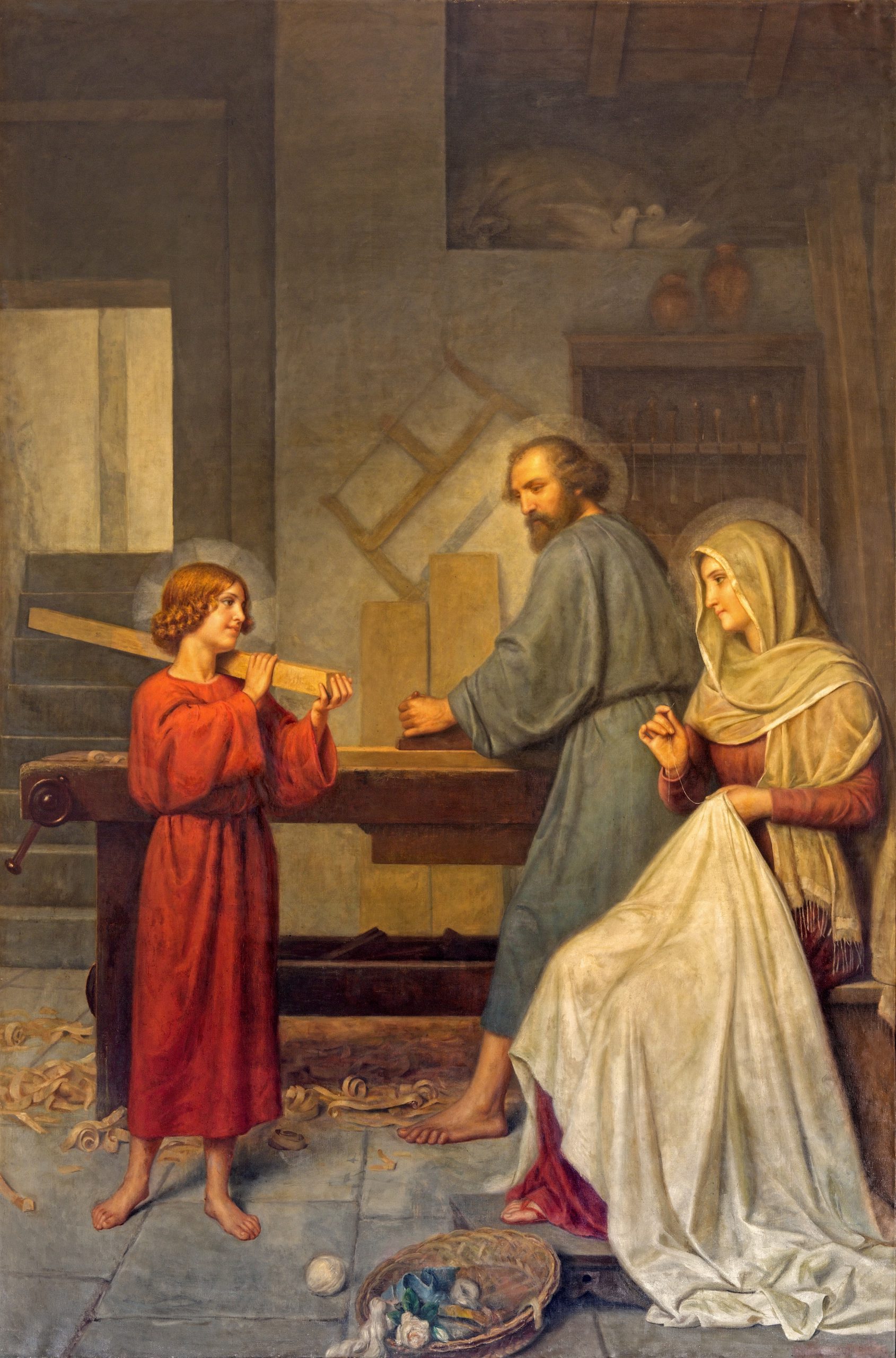
ROME, ITALY - MARCH 25, 2015: The painting of Holy Family by Angelo Zoffoli (1860-1910) in baroque church Basilica dei Santi Ambrogio e Carlo al Corso.
By Jake Geis
Statues are funny things. As representational art, they place faces on people we’re not likely to see, either due to the featured person’s social status or their passing eons ago. However, statues are as dehumanizing as they are humanizing. Frozen in position, eyes fixated on one point, the people behind the statues can feel surreal.

I’d venture to say most every parish in this diocese has a statue of the Holy Family. And why shouldn’t they? Our Savior, our Blessed Mother and their earthly provider (St. Joseph) are the three most important people who walked this earth. The statues remind us of them and hold them in the esteem they deserve.
But, as beneficial as the statues are, they can lead us to place an invisible wall in front of the real people they represent. Living, breathing humans who had a home and small business together. They had a life that was far from idyllic: an unplanned pregnancy (albeit under unique circumstances), doubts from the husband about his wife, and living as refugees for a time were part of their family story. And remember that time they lost the kid? They only had one to keep track of!
Just like us, they were a family—a family who not only had struggles but had their fun times too. From the Gospels, we see Jesus’ quick, adept mind in debates. Could you imagine how funny he had to be when he applied it to humor? So, we see a family who laughed while they worked together, crafting beautiful, functional items used throughout their community. Through sorrow and joy, they bonded in a way that most of us would long for our families to bond.
Strong and joyful
What’s encouraging is our families can have that bond like the Holy Family. As a human family, the Holy Family was like us in so many ways, yet different in a small, but significant few. They practiced two virtues—humility and self-sacrifice—that made their family unique, stable, strong and joyful.
Every member of the Holy Family could have their name written down in the dictionary next to the word “humility.” Every member of the Holy Family sacrificed themselves for the sake of each other. In the small country town of Nazareth, Joseph crafted quietly, raising the child who was not of his contribution. Mary dedicated her life to this single child and turned all focus onto him throughout her life. And Jesus, the master of the universe, submitted himself through obedience to two creatures who loved him deeply.
What would your family look like if humility and sacrifice were the two guiding virtues of each family member’s existence? Though I’m a far cry from getting these right all the time, I can say from experience that when I focus on these aspects while interacting with my wife and daughter, life is so much more fulfilling. A father doesn’t get a giddy toddler when he walks in the door if daddy’s always rushing to finish another project. Instead, when he drops down on the floor and swoops up his little girl every single evening, forgoing all the “important” work for the time being, that’s how a man can experience true joy.
Or, instead of sitting down and resting after work, he makes supper for his wife, or at least plays with the half-pints so his bride can focus on the food. And by looking at each other instead of the phone when a spouse is talking, we not only hear, but listen. Then instead of being the couple who argues over what drivel should be on the television as they fall asleep, a man and his wife can grow in an authentic, passionate relationship.
These are only a few examples of using the humility and sacrifice of the Holy Family as a guide; there’s a host morea person could apply in their life.
Humility and sacrifice
Of course, the biggest barrier between us and the Holy Family is we don’t always get it right like they did. Well, at least Jesus and Mary. Poor St. Joseph—his child is God and his wife is immaculate, so when something went wrong it was probably his fault.
For us, there may be a hesitation that we can’t be perfect either. Yet, as we incrementally grow in sacrifice and humility, our family relationships improve faster. Ask the family of a reformed alcoholic—that person still has failings, but the change allowed wonderful things to occur in their world.
Another hesitation is that we can’t control how others in our family will react. Sure, we can be better, but if the others don’t change, aren’t we just going to be taken advantage of? And the answer is yes. The struggle with putting others first when they don’t return the favor is gut-wrenching. The phrase “no good deed goes unpunished” sure didn’t appear out of thin air!
But when making a conscious decision to live as Christ calls us, you’re in this for the long haul. Expect results to take a while, too. Superficial change is fast and, well, just superficial. Like painting a picket fence, that shiny white paint starts to peel with a few tough storms, showing the weathered old wood again in no time.
You’re in this for true transformation—of self and family. This ain’t baking a store-bought apple pie, this is planting the apple tree. Expect years of tending and watering to bear fruit. But if you’ve had homemade apple pie with homegrown apples, you know store-bought just doesn’t compare.
Keeping up with the Nazoreans
In the same vein, the warmth and joy of a beautifully strong family beats the veneer of a “perfect” family painted by the culture of today. Don’t try to keep up with the Joneses, with their lovely home and talented children subsidized on the back of workaholic parents, a chaotic after-school schedule and nonexistent relationships between all members of the house. Only on TV does that life ever work out right.
Keep up with the Nazoreans. They’re poorer and have had a rough go in life, but when they sit down to say grace over supper as a whole family, the fulfilling peace and love that surround them are superior to anything else this world has to offer. Guided by their example of humility and self-sacrifice, your life will be rewarded in ways beyond your wildest dreams.


